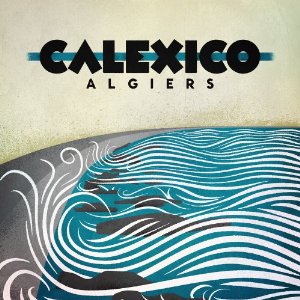New Orleans has a complex relationship with water. Not long after he arrived there, the Greek–Irish writer Lafcadio Hearn wrote of the city’s "phenomenal" dampness: "It descends from the clouds and arises from the soil simultaneously; it exudes from wood–work; it perspires from stone…"
Fed by and feeding that moisture are the infinite gallons of water that threaten to flood in from the surrounding lakes and over the banks of the Mississippi – the river that is also the city’s lifeblood. New Orleans’ struggle with the ominous power of that particular waterway (Tennessee Williams wrote that one could "almost feel the warm breath of the brown river") is well documented. Perhaps then it is not surprising that Algiers – Calexico’s eighth album, recorded in the Louisiana city’s oldest parish – has absorbed some of that stifling humidity.
Joey Burns has described New Orleans as being "Strong and bold, soulful to the core, but surrounded by a sea of darkness" and it is when Algiers channels these qualities (which suit Calexico so well), that the band reach their most powerful.
‘Sinner in the Sea’ crescendos in jarring organ stabs and Burns’ maniacal yells ("Shout me a line sister! Oh I see you on the other – see you drowning on the other… side… SAAAAAIIIIIIIIDE!"), while ‘Para’ builds with sinister malice. "Take it all the way down… below… the waterline", sings Burns before the song finally suffocates amid the cascading wave of tension that continues to linger throughout the instrumental title track and resurfaces again midway through the sleazy, Latin stomp of ‘Puerto’.
With all this in mind, it might seem surprising that Calexico’s label have emphasised the catchiness of the new material. While their description of Algiers as "exciting and song–y" is as misleading as it is cringeworthy, there are some surprisingly straightforward moments, the optimistic opening march of ‘Epic’ and the restless, The Suburbs–esque second track ‘Splitter’ being two of the most compelling.
The approach is not always successful – ‘Fortune Teller’ and ‘Hush’ threaten to drift by almost unnoticed – but by the time the shimmering brass and strings of bittersweet album closer ‘The Vanishing Mind’ ("It’s what brought you here, It’s what keeps you here") have drawn to a close, the darkness and light combine, echoing the complexities that have long fascinated visitors to New Orleans.
Algiers isn’t so much a portrayal of New Orleans as it is a manifestation of the city’s often observed ability to both elevate and weigh heavily on the soul. To achieve that successfully – and to do so without becoming preoccupied by the much–dredged emotional and artistic post–Hurricane Katrina landscape – is a great challenge. And although one or two songs struggle to exhibit the strength or tenacity that Burns sees in New Orleans, Algiers remains haunted throughout by the city’s spirit. "Strong windows and doors cannot keep it from entering", wrote Lafcadio Hearn. "You might as well try to lock out a ghost."


